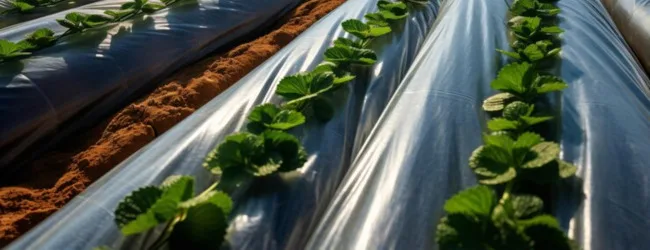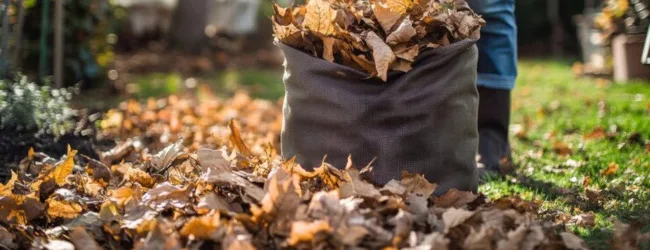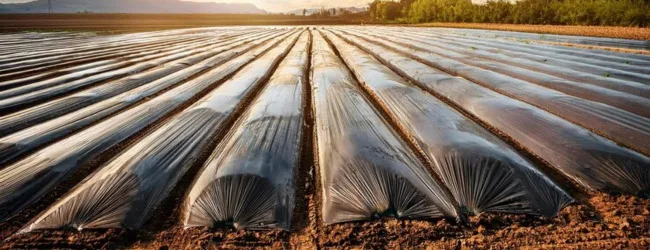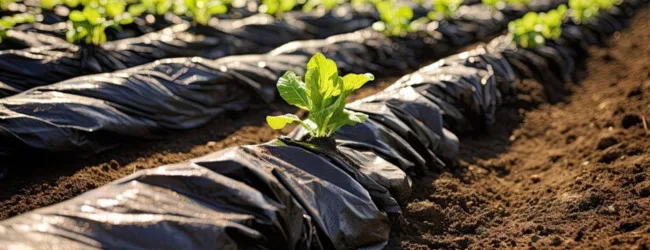Table of contents
- What is Mulching Farming?
- Types of Mulching Materials
- Choosing the Right Mulch for Your Crop
- Benefits of Mulching in Indian Agriculture
- Where is Mulching Farming Popular in India?
- Steps to Implement Mulching on Your Farm
- How Mulching Farming Helps in Crop & By-product Sale
- Challenges in Mulching Farming
- Real-Life Example: Tomato Farming in Maharashtra
- Conclusion
- FAQs: Mulching Farming in India
Mulching farming is one of the smartest techniques to improve soil health, retain moisture, and boost crop yields without excessive investment. While it’s already popular in developed countries, Indian farmers are now rapidly adopting this practice for sustainable agriculture.
What is Mulching Farming?

Mulching is the practice of covering the soil with organic or synthetic materials to conserve moisture, regulate temperature, reduce weed growth, and improve crop productivity.
Why is Mulching Important?
- Retains soil moisture and reduces the need for frequent irrigation.
- Prevents weed growth, reducing dependency on herbicides.
- Improves soil fertility when organic mulch decomposes.
- Protects crops from extreme temperatures.
- Reduces soil erosion by wind and water.
Types of Mulching Materials
There are two major categories:
1. Organic Mulch

These are natural materials that decompose over time.
- Straw and Hay
- Dry Leaves
- Coconut Husk (commonly used in South India)
- Sugarcane Bagasse (popular in Maharashtra and UP)
- Farmyard Manure (FYM)
- Compost and Green Manure
2. Inorganic or Synthetic Mulch

These do not decompose and are used mainly for commercial farming.
- Plastic Mulch Sheets (Black/Silver)
- Polyethylene Film
- Rubber Mulch
Choosing the Right Mulch for Your Crop
Use this quick guide to match mulch with your crops:
| Crop Type | Suggested Mulch Type | Reason |
|---|---|---|
| Vegetables (Tomato, Brinjal) | Black Plastic Mulch | Warms the soil, reduces weeds, boosts yield |
| Fruits (Mango, Banana) | Straw/Coconut Husk | Natural insulation retains moisture |
| Spices (Turmeric, Ginger) | Green Manure/Compost | Enhances soil nutrients |
| Flowers (Marigold, Rose) | Dry Leaves/Straw | Aesthetic + organic nutrition |
💡 Pro Tip: If you want to start a Business but have too many doubts, connect with a Business expert from Boss Wallah for guidance – Check Out
Benefits of Mulching in Indian Agriculture
1. Water Savings
- Mulching reduces water evaporation by up to 70%.
- Helps in drip irrigation efficiency.
2. Higher Yields
- Farmers in Punjab using plastic mulch for watermelon saw a 30-40% yield improvement.
3. Soil Health
- Decomposing organic mulch increases soil organic matter.
4. Reduced Labour & Input Costs
- Weeding labour can be cut down by 60-80%.
Where is Mulching Farming Popular in India?
- Punjab, Haryana, Maharashtra, and Tamil Nadu are leading states.
- Widely used in vegetable and fruit cultivation, especially in polyhouse farming.
- Government Schemes under MIDH (Mission for Integrated Development of Horticulture) promote mulching.
ALSO READ | Contour Farming: Meaning, Practices, Advantages & Challenges
Steps to Implement Mulching on Your Farm
Step 1: Test Your Soil
- Use a basic soil testing kit or consult Krishi Vigyan Kendras (KVKs).
Step 2: Choose the Right Mulch Type
- Organic or inorganic, depending on crop and budget.
Step 3: Prepare the Land
- Remove weeds, level the soil.
Step 4: Apply Mulch Properly
- Ensure a 2-4 inch layer.
- Keep mulch 1-2 inches away from the plant stem.
Step 5: Monitor and Maintain
- Check the mulch breakdown in the organic type.
- Replace plastic mulch after each crop cycle.
How Mulching Farming Helps in Crop & By-product Sale
- Improved quality = better market price.
- Faster growth = multiple crop cycles = more profit.
- By-products like composted mulch can be sold or reused.
ALSO READ | Carbon Farming: What is it, Techniques, Benefits, Challenges & More
Challenges in Mulching Farming

- Initial setup cost for plastic mulch sheets.
- Disposal of synthetic mulch (needs eco-friendly practices).
- Lack of awareness among small-scale farmers.
Real-Life Example: Tomato Farming in Maharashtra
Farmer Ramesh Patil from Nashik used black polyethene mulch on 2 acres. His:
- Water usage reduced by 60%
- Tomato yield increased by 35%
- Weeding costs dropped significantly
Need Expert Guidance?
Starting a business can be challenging, but you don’t have to do it alone! At Boss Wallah, our 2,000+ business experts are ready to provide valuable insights and guidance. Whether you need help with marketing, finance, sourcing, or any other area of any business, our business experts are here to help you succeed
Confused about Which Business to Start?
Want to start your own business but unsure which one to choose? Explore Boss Wallah, where you’ll find 500+ courses by successful business owners, featuring practical, step-by-step guides on starting and growing various businesses.
Find your perfect business idea today
Conclusion
Mulching farming is a proven technique to increase productivity, conserve water, and improve soil health. It is an essential step towards sustainable farming in India. With government support and simple methods, any farmer can adopt mulching techniques to boost income and crop quality.
FAQs: Mulching Farming in India
1. What is mulching in farming?
- Covering soil with organic or synthetic material to retain moisture and reduce weeds.
2. Which mulch is best for vegetables?
- Black plastic mulch is ideal for vegetables like tomato and brinjal.
3. Is mulching good for all crops?
- Yes, but the mulch type should be chosen based on crop requirements.
4. What is the cost of mulching sheets in India?
- Rs. 6000-10,000 per acre for plastic mulch (as of 2025).
5. Where can I buy mulch sheets in India?
- Available at agri-stores, Amazon, and government-approved suppliers.
6. How long does mulch last?
- Organic mulch lasts 2-6 months; plastic mulch can last a full crop cycle.
7. Is a government subsidy available for mulching?
- Yes, under the MIDH and NHM schemes.
8. Does mulching reduce water usage?
- Yes, it can reduce water needs by up to 70%.
9. Can small farmers use mulching techniques?
- Absolutely, organic mulch is low-cost and easy to apply.
10. Is mulch farming profitable in India?
- Yes, especially in high-value crops and with good market access.


